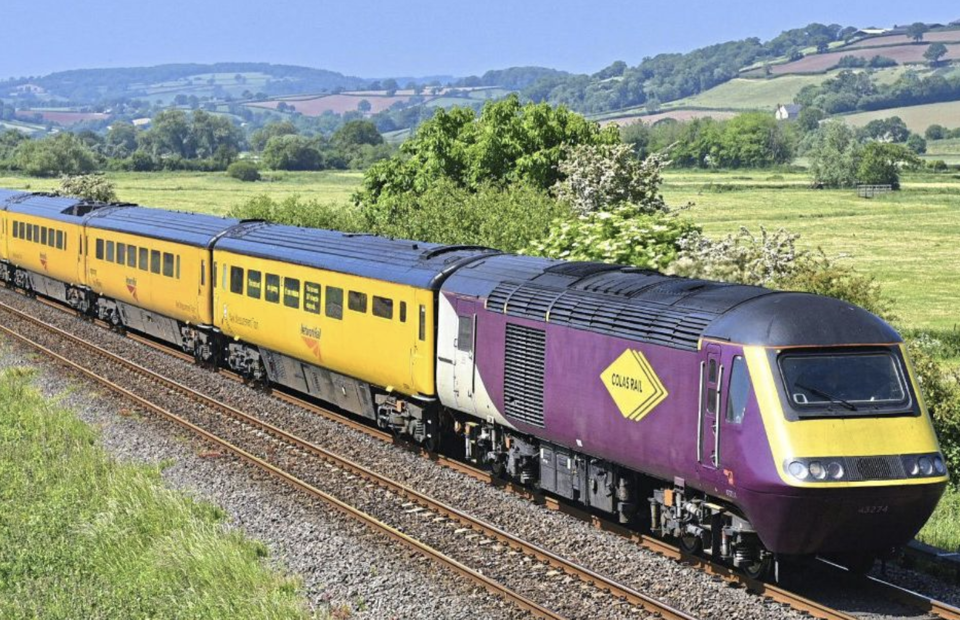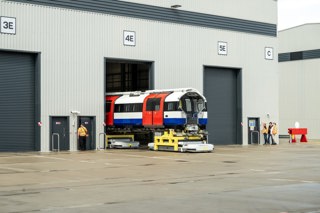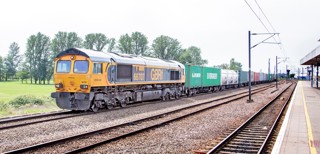The UK has a rich history of innovation and advancement in the rail industry, from the pioneering days of steam locomotives to the high-speed trains we see today.
However, in today’s globalised world, maintaining a competitive edge requires the embrace of emerging technologies. Digital Catapult continues to work with businesses in all sectors to identify innovative solutions that can improve efficiency and solve industry challenges, by leveraging emerging technologies such as digital twins, artificial intelligence (AI), and the ‘internet of things’ (IoT).
With the UK rail industry serving as a key component of connectivity across the country, and with businesses looking to rail as a means of cutting their carbon emissions, the industry must adopt emerging technologies to enable long-term success in the future.
Doing so will not only keep the UK’s rail industry ahead of global competition, it will also be critical to paving the way for a more innovative and sustainable rail network.
Rail as a mobiliser
The rail industry plays a vital role in driving the UK’s economic growth. It serves as critical transportation infrastructure, facilitating the movement of goods, services and people across the country. The industry directly contributes to the economy by generating employment opportunities, attracting investments, and fostering innovation.
A recent report commissioned by the Railway Industry Association and carried out by independent researchers at Oxford Economics found that rail supports £43 billion GVA in economic growth, 710,000 jobs, and £14bn in tax revenue.
For every £1 spent on rail, £2.50 of income is generated in the wider economy, demonstrating how the rail industry is a key mobiliser of economic growth in the UK.
Britain’s rail network further enables businesses to connect with customers and suppliers, subsequently promoting trade and commerce, and boosting tourism by providing convenient transport options for domestic and international travellers.
It should also be noted that the rail industry’s contribution extends beyond its operations. The UK rail industry is key to the success of other traditional British sectors such as manufacturing, construction and logistics.
In fact, the UK’s rail network is increasingly touted as a solution for businesses across industries that are looking to cut their carbon emissions and improve the sustainability of their supply chain.
While the UK rail industry is a key mobiliser of economic growth, it’s also key to helping businesses of all sizes cut their carbon emissions. More decision-makers are considering rail as a means of transport for their business, preferring the environmental advantage of rail freight over vehicles on the road.
For example, rail freight produces 76% fewer emissions than the equivalent heavy goods vehicle (HGV) journey, with each freight train removing up to 76 HGVs from roads, resulting in 1.66 billion fewer HGV kilometres a year.
As such, more businesses are recognising the value that rail can have on their operations, and the importance of the country’s rail network and infrastructure on long-term business growth and success.
This is particularly the case as businesses expect full transparency on carbon emissions as a prerequisite for commercial partnerships and collaboration.
A growing number of businesses are taking this even further, by expecting to see potential business partners taking steps to reduce greenhouse gas emissions (GHGs) where possible.
Rail is therefore being increasingly used as an effective means for industry to improve the results of their carbon accounting, achieve their sustainability goals, and act as the foundation from which successful business partnerships can be established.
The economic impact of the rail industry on a national and international level is clear. But success on the global stage will rely on the industry’s embrace of emerging technologies, to remain competitive and sustainable in the long term.
Emerging technologies
Emerging technologies are increasingly adopted by businesses in all sectors. From distributed ledger technologies used in shipping, AI leveraged for logistics, and immersive technology utilised by manufacturing companies, a growing number of industries are recognising the importance of embracing new technology to keep up with global competition.
At Digital Catapult, we support businesses in every sector (including rail) to develop tech-enabled solutions that help them to overcome industrial challenges and achieve sustainable growth.
We are working with HS2 Ltd to deploy 5G solutions, manage assets remotely, and build an operational culture that uses data at the heart of its operations.
More rail companies need to embrace emerging technologies to improve their operational efficiency, cut costs, and improve service quality. Doing so can lead to optimised processes, streamlined operations, and a seamless business and customer experience - not forgetting to mention how new technologies such as digital twins can bolster rail companies’ sustainability credentials, too.
“Each business faces unique challenges, and while the collective efforts of rail companies contribute to a more sustainable global rail network, true progress begins at the individual level.”
Digital Twin technology holds immense value for the rail industry and has a significant impact on improving the competitiveness of the UK rail industry on a global stage. Digital twins enable the creation of virtual replicas of physical assets, allowing for real-time monitoring, analysis and optimisation.
While many Digital Twin technologies already exist, it is the combination of tools, capabilities, infrastructure and applications for specific use cases that will enable them to be exploited more quickly by the rail industry.
Digital Catapult is working with the Department for Science, Innovation & Technology to understand the potential value of and options for a UK capability in digital twinning and the wider cyber-physical infrastructure.
For rail companies that implement digital twins into their operations, it can lead to significant advantages such as improved operational efficiency, reduced downtime, and better maintenance practices - all of which lead to cost savings and increased productivity.
However, digital twins aren’t the only type of emerging technology to yield great results for rail companies, from both a competitive and sustainable perspective.
Quantum computing has the potential to transform optimisation algorithms which will enable rail operators to solve complex problems more efficiently and effectively. This can lead to improved scheduling, resource allocation and route planning, enhancing operational efficiency and reducing costs.
Moreover, IoT devices and sensors embedded into rail infrastructure can collect vast amounts of data in real-time. AI algorithms can also be analysed to identify patterns, predict maintenance needs, and optimise energy consumption - helping more rail companies to reduce the level of GHGs they emit, and to meet their environmental objectives.
The adoption of these emerging technologies will empower the UK rail industry to stay competitive while embracing sustainable practices and driving innovation, setting the UK apart from other markets.
Driving sustainable leadership
Embracing sustainable innovation is not a one-size-fits-all approach for rail companies.
Each business faces unique challenges, and while the collective efforts of rail companies contribute to a more sustainable global rail network, true progress begins at the individual level.
By embracing emerging technologies and sustainable innovation, rail companies can differentiate themselves from competitors in the UK and inspire others to follow suit.
Adopting new technologies enables these companies to showcase improved efficiency, performance, and cost reduction. Moreover, it allows them to exemplify the importance of sustainable leadership and environmental responsibility to other businesses.
By implementing innovative solutions that demonstrate the reduction of carbon emissions and optimisation of energy resources, rail companies can pave the way for the future of the British rail industry through collaboration and partnerships.
This approach not only sets a precedent, but also encourages peers to prioritise sustainability, fostering a collective effort towards a greener and more innovative rail industry that will help the UK’s rail industry to effectively compete on the global stage.
With a business landscape that prioritises sustainability and ESG (environmental, social and governance) metrics, as Head of Sustainability at Digital Catapult, I’ve seen how embracing digital transformation can help businesses win new contracts and establish successful partnerships.
Businesses are increasingly expected to disclose their carbon emissions, and their mechanisms for carbon accounting, in addition to other measures they have taken to achieve outlined net zero goals.
This disclosure not only fosters transparency, it also encourages collaborative efforts among businesses that share a commitment to reaching the UK Government’s target of net zero by 2050.
By aligning on sustainability initiatives and working together, rail businesses can form partnerships that drive collective action and accelerate progress towards a carbon-neutral future.
This is another reason why embracing emerging technologies is crucial for the UK rail industry’s global competitiveness and sustainable leadership. By doing so, the industry can establish vital partnerships that not only accelerate economic growth within the rail sector, but also benefit other key sectors that heavily rely on rail.
The UK rail industry must embrace emerging technologies for global competitiveness and sustainable leadership.
Digital twins, AI, IoT, and quantum computing offer advantages in real-time monitoring, optimisation, emissions reduction, and resource allocation. Embracing these technologies fosters collaboration and sets a global gold-standard on rail innovation and sustainability.
Leveraging digital transformation secures the industry’s position as a global leader, contributing to economic growth and a greener transportation network.
■ Learn more about how Digital Catapult supports rail companies in enhancing innovation and sustainability at https://www. digicatapult.org.uk/clients/transport-and-infrastructure/.
Dr David Pugh Head of Sustainability, Digital Catapult


















Login to comment
Comments
No comments have been made yet.